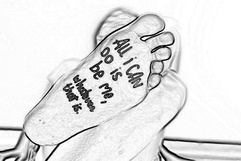 I will preface this post by saying I have never taken a psychology class with the exception of a SUNY Potsdam course entitled “Child Development” which briefly touched on the ideas of: Maslow, Piaget, Freud, Erikson, and Pavlov, etc... I didn't commit much psychological theory or theorists to memory, in fact, I found the class completely yawn inducing. That being said, I have always had a fascination with behavioral science and I have been accused of armchair psychiatry by many members of my family, more than once. Based on that underlying curiosity, when I tuned into RadioLab, a couple weeks ago, to hear the introduction of an episode called Choice about the various and numerous psychological studies that look at how humans make decisions, I was mildly interested. Then when hosts Robert and Jad started talking about a particular research project that looked like a simple memory test, but was actually an investigation into how the brain is hard-wired to resist self-control in certain circumstances, I was completely hooked. In this study, the researchers gave participants either two or seven numbers to memorize and sent them to another room to recite the number. On their way to the other room, however, while they are saying the number over and over to keep it in their heads, someone approached them and asked if they would like a snack of either a bowl of fruit salad or a piece of gooey, frosted chocolate cake. Overwhelmingly, the people trying to keep two numbers in their head chose the bowl of fruit and the people memorizing the seven numbers chose the chocolate cake. The researchers concluded that the people who had two numbers were able to stay rational and choose the healthier snack; where as, the people trying to keep track of the seven numbers were distracted, frustrated, and overwhelmed, so their brains short-circuited and they chose the unhealthy, but more mouth pleasing snack. In another study, a researcher showed the same written profile of one individual to participants and asked if they liked the person based on just the qualities written in the profile. But first, he contrived a way for them to hold either a paper-cup of hot or iced coffee for about one second before looking at the profile. Again, with overwhelming numbers, the people who held the warm cup said they liked the person and the people who held the cold cup said they didn't. Whoa, their perception of the person was based solely on the feeling of the cup- warm represents a comforting, loving person and cold is characteristic of a hard and unyielding person. Their brains did not even assess the actual profile. He also did another study using color instead of temperature and discovered black has negative connotations and white represents positive. This is fairly disturbing to even consider. We talk about teaching color-blindness in terms of race relations and social justice, however, as it turns out, our brains are not color blind at all, they associate definite feelings with each color. Psychologists have developed an iceberg diagram to represent conscious and subconscious thought. Everything below the water line is our subconscious and we are only cognizant of the very small tip peaking above the waves. Our brains are working overtime and we aren't even aware of what they are doing most of the time. Therefore, our rational, socially evolved selves can acknowledge equity for all, environmental and social justice, peace, and love, but underneath our brains may be sabotaging all that. Is it really true that we can't outrun or outsmart our biology? The amazing Jane Goodall was the first to discover that chimps were not the peace loving, docile vegetarians they were believed to be. During her forty plus year career of documenting chimpanzee behavior, she has watched them kill and eat colobus monkeys, take part in kidnapping and infanticide, and participate in full blown war between distinct groups and clans. Yes, our closest living biological relatives (they share 98% of our DNA) can be war mongering, malicious, self-centered, and downright nasty. This information along with the many psychological studies showing our lack of will power in certain circumstances, as well as our brain's manipulative powers is fairly damning for the human species. Can humans rise above our basic biological inclinations? Could that possibly be the next evolutionary step for man-kind? These are questions I was considering, feeling more depressed as the thoughts swirled through my head. Then, I listened to an episode of This American Life with Ira Glass called Batman which was profiling the brand new radio show Invisibilia. What I heard gave me considerably more information to contemplate as well as raise my dejected spirits. The hosts of this new show, Alix and Lulu interviewed a scientist who did a study about perceptions and expectations using rats and humans. The evening before the study began, he went into the lab and randomly labeled the rat's cages, “smart” or “dumb” indicating the intelligence of each rat. These signs, however, were not true; all of the rats were of the same average intelligence. The people who were part of the study were asked to put these rats through a maze. It was noted that the rats with a “dumb” label did poorly and the rodents identified as “smart” did very well. Now remember all of the rats were exactly the same level of intelligence! What was going on? The researcher observed that the rats labeled “dumb were treated coldly and handled with little emotion, while the rats labeled “smart” were loved up and treated with kindness. He determined that our preconceptions and expectations alone determine how we treat someone/thing and the outcome matches those sentiments. I don't even want to consider how this plays out in a classroom--- but the 1964 Harvard University study I mentioned in the previous post entitled the Problem with Labeling gives us some clues... The hosts went on to explore the idea of how expectations influence a persons abilities and behavior. They spent time with, Daniel, a blind man who could “see.” At a very young age, his eyes were removed because of cancer and he developed a clicking, sonar like system, similar to a bats. He was a very rambunctious, energetic, over the top child and his mother refused to hold him back or coddle him just because he didn't have eyes. He climbed trees and other tall structures; he ran; he rode a bicycle; he hiked in the wilderness; he did all the things any wildly rambunctious, outdoor loving kid would do. As the story progressed, the audience learns that when a scan was taken of the part of his brain that indicates sight, his lit up like a Christmas tree. According to this brain scan, he can see! His mother treats him like any normal sighted person and Daniel behaves as one. Sounds crazy, right? Now back to my question about humans: is it possible to outrun or outsmart our basic biology? After listening to and contemplating these stories as well as my own experience, I personally would say “yes.” If we choose to live with awareness, intention, and integrity (take responsibility for our feelings and actions), and if we choose to be honest and kind with ourselves, that grace will spill over into our interactions with others. And, as we have seen from these psychological studies, warmth, good intentions, favorable perceptions, and positive expectations towards others, influences their behavior. Yes, a major portion of our psyche is buried deep within our brains, but, in the end, I believe, life is all about making conscious choices. Will you be kind, warm, and honest or will you be condescending, sly, and unpleasant? Will you be empathetic or will you be cruel? Will you interact with humor and affection or will you be aloof and cold? This is not to say that we can't have an occasional grouchy day, we've all been there. But think about the times you have been in the company of someone who puts zing into everything they do---made you feel like zinging too, right? Sometimes it takes effort, but seeing, and feeling, the results of emitting positive vibes and embracing life is worth taking the time to think your actions through. Eventually those conscious choices become internalized and your subconscious will takeover. Before you know it, you will be embracing your genuine, weird, warm, honest, giving, and zany self with abandon and it will feel as natural as breathing.
1 Comment
vikas
5/29/2015 03:35:02 am
A mind blowing explanation. Thanks.
Reply
Your comment will be posted after it is approved.
Leave a Reply. |
|
© 2024 Whole Learners, Inc. 501(c)3
Deep Root Center
48 Riverside Drive, Canton, NY 13617
315*323*1435/[email protected]
Deep Root Center
48 Riverside Drive, Canton, NY 13617
315*323*1435/[email protected]



